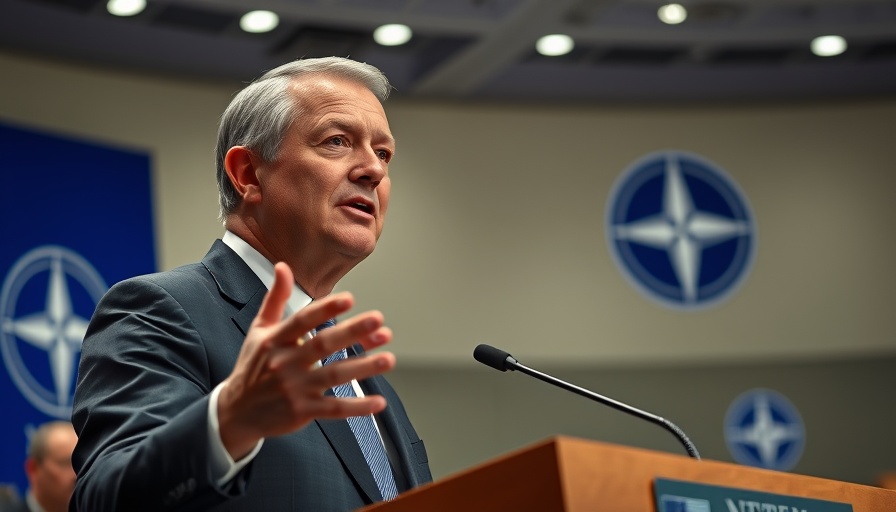
Shifting Dynamics in the Middle East Following Recent Strikes
The ongoing tensions in the Middle East have taken a new turn following a series of military strikes against Iran by Israel and the United States, with significant implications for peace and international law. Prime Minister Benjamin Netanyahu’s declaration of victory over Iran has shifted the focus back to Israel's regional influence, while President Trump’s assertion that these strikes have set back Iran's nuclear capabilities has raised questions about the credibility of U.S. intelligence.
In 'Trump's Claims on Iran's Nuclear Setback', the discussion dives into the complexities of U.S. and Israeli military actions in the Middle East, exploring key insights that sparked deeper analysis on our end.
Exploring Claims of Success Against Iran's Nuclear Program
While President Trump has confidently stated that military actions have significantly hindered Iran’s nuclear program, a leaked intelligence report suggests that the impact may not be as profound as claimed. As Defense Secretary Pete Hicks characterized the assessment as low confidence and preliminary, it further complicates the narrative being constructed around the U.S.’s actions in the region. This contradiction has not only fueled skepticism in intelligence reporting but has also prompted a broader discussion about the efficacy of military strategies in international relations.
The Debate Over Legality of Military Interventions
As Dr. Masimba Mavaza highlighted in his interview, the legality of these military strikes raises serious international law issues. The actions taken against Iran potentially violate Article 2, Section 4 of the United Nations Charter. The principle of self-defense is often cited, yet the legitimacy of such preemptive strikes is frequently challenged, particularly when the threat level is not perceived as imminent by international observers. Analysts argue that the United States is positioning itself as a global enforcer, yet risks overshadowing the principles of international law.
A Bully Perspective: U.S. and Israel’s Combined Power
The term ‘bully’ came into focus during discussions about Israel’s military actions and their backing by the United States. Such language evokes the underlying tensions between larger and smaller states, particularly in the context of geopolitical conflicts. Israel’s ability to act militarily in the region, supported by the U.S., prompts concerns about power dynamics and the long-standing narrative of oppression and resistance. The influence of American military power undeniably shapes these interactions, raising questions about accountability in global conflict management.
Humanitarian Concerns Amidst Military Actions
The aftermath of the recent strikes also raises pressing humanitarian issues. As the situation stabilizes, daily life in Iran remains uncertain. Civilians often bear the brunt of military conflicts, creating a cycle of suffering and resentment that can breed further instability. Acknowledging the human impact of geopolitical strategies is crucial, as it reminds stakeholders of the real lives affected by their decisions.
Foreshadowing Future Negotiations and Regional Stability
Despite current tensions, the resumption of dialogue between Iran and Israel or the United States may be necessary for long-term stability. Dr. Mavaza suggests that genuine talks cannot occur amid ongoing military provocations. Histories of conflict between such nations teach us that forced dialogue rarely leads to sustainable solutions. The prospect of peace remains fragile, hinging on respect for international norms and a commitment to negotiations devoid of ulterior motives.
Civil society in Iran and Israel plays a pivotal role in advocating for peace and understanding. Ultimately, sustained engagement and a willingness to move beyond historical grievances may pave the way for a broader security framework. The events in the Middle East will require astute observation, as the balance of power continues to shift.
Reflecting on International Response and the Path Ahead
As the international community watches, the dynamics within the Middle East offer crucial lessons on the nature of power and conflict. What emerges from the current geopolitical climate could lay the groundwork for better cooperation across nations. The reactions from both the U.S. and Israel to Iran’s nuclear ambitions must be handled delicately; aggressive tactics may backfire and create an even more entrenched adversarial relationship.
Moving forward, the need for a revised understanding of alliances between nations will be vital. A commitment to diplomacy over military action could redefine regional stability, highlighting the importance of treaties and respect for international laws as the path towards a peaceful coexistence.
 Add Row
Add Row  Add
Add 


Write A Comment